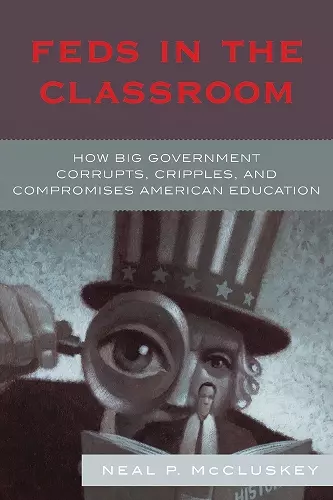Feds in the Classroom
How Big Government Corrupts, Cripples, and Compromises American Education
Format:Paperback
Publisher:Rowman & Littlefield
Published:26th Apr '07
Currently unavailable, and unfortunately no date known when it will be back
This paperback is available in another edition too:
- Hardback£92.00(9780742548589)

Thomas Jefferson warned that 'the natural progress of things is for liberty to yield and government to gain ground.' American elementary and secondary education shows how right he was. Two centuries ago the founders rejected federal participation in education and even rejected George Washington's plans on establishing a national university. It should be of little surprise, then, that the term 'education' appears nowhere in the Constitution. Few early Americans would have considered providing education a proper function of local or state governments, much less some distant federal government. Federal control of the nation's schools would have simply been unthinkable. This view was the prevailing one well into the 20th century. In the 1980s, Ronald Reagan campaigned, in part, on a proposal to close the federal department of education. How things have changed in a few short decades. Today, every state requires children to attend school, and most dictate precisely what the children will learn. Parents, in contrast, are able to make very few choices about their children's education. And what role does the federal government have now? It has drilled deep into almost every public classroom in America. Washington can now tell public schools whether their teachers are qualified, their reading instruction acceptable, and what they must do when their students do not achieve on par with federal demands. At the outset of his presidential administration, for example, George W. Bush pushed for the largest federal encroachment in education in American history. Through his No Child Left Behind Act, the federal government can dictate what will be taught, when, and by whom, to most of the 15,000 public school districts and 47 million public school children. Why the change? Is it a change? What's the cost to the taxpayers? What are the benefits to public school students? To public schools? Today, with the almost-complete consolidation of education authority in the hands of policy makers in Washington, the last of our educational liberty has been pushed to the brink of extinction. Thankfully, there is still hope: Over just the last decade-and-a-half, school choice - public education driven by parents, not politicians and bureaucrats - has become a force to be reckoned with. Feds in the Classroom will challenge much of the conventional wisdom surrounding federal involvement in education. The author considers all federal activities-legislation, funding, regulations, and judicial oversight-and then makes a cost-benefit and constitutional assessment.
Neal McCluskey has written an energetic critique of federal education policy and the federal government's growing role in K-12 schooling. While some readers may disagree with McCluskey's analysis, this is a book certain to provoke lively debate. -- Frederick M. Hess, director of education policy studies at the American Enterprise Institute
Excellent at several levels, Feds in the Classroom provides essential historical background and dissects key programs, court cases, and statistics. McCluskey brilliantly illustrates how intervention often, if not typically, produces the opposite of the intended result, and he points the way out of the political morass that engulfs U.S. K-12 education. -- John Merrifield, University of Texas, San Antonio
The expansion of the federal government's role in education has been ineluctable, and mostly destructive. This book serves as a much-needed reminder that 'accountablity' in education must mean accountability to parents, not to federal mandarins. -- Michael Greve, American Enterprise Institute
McCluskey shows how Washington politicians—representing bureaucrats and unions, rather than parents and students—wrestled control of public schools from local communities. Washington's soaring spending and meddlesome regulations have brought academic mediocrity and social strife. McCluskey weaves through the history, law, economics, and politics of federal education policy, and offers a commonsense solution that empowers parents and local communities. It is a well-researched and fascinating book for anyone interested in fixing America's schools. -- Brian Riedl, The Heritage Foundation
McCluskey reminds readers why well-intentioned calls for federal leadership and shiny plans for national programs can ultimately prove treacherous. * Education Next: Journal of Opinion And Research *
The over-riding value of Neal McCluskey’s work is that it shows that most federal educational programs are overwhelmingly useless, if not counter-productive. -- Myron Lieberman, chairman, Education Policy Institute
Neal McCluskey's Feds in the Classroom is an essential read for policy-makers at any level of government. McCluskey compiles an accurate report card for our nation making it clear that only serious change will save the American public education system from flunking outright. Feds in the Classroom provides an historical, constitutional, and judicial scrutiny of federal education policy that I recommend to anyone who wants to know why America is not the global leader in public education, despite our extraordinary resources and limitless supply of American ingenuity. McCluskey's book has quickly become an essential resource for myself and my staff, and I encourage anyone interested in education policy to arm themselves with the facts provided within it. -- Congressman Scott Garrett (R-NJ)
ISBN: 9780742548596
Dimensions: 230mm x 148mm x 18mm
Weight: 318g
224 pages